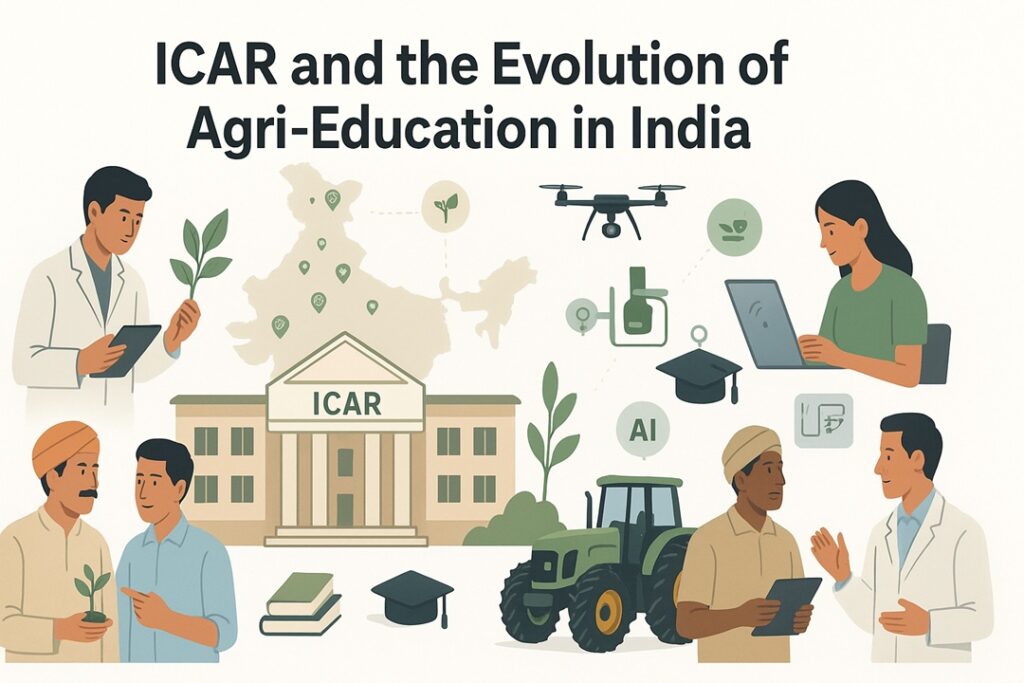“ICAR and the Evolution of Agri-Education in India”

Context
The Government of India has undertaken several initiatives to strengthen agricultural education, research, and skill development to enhance productivity and promote innovation in the farming sector.
Indian Council of Agricultural Research (ICAR)
Apex Body for Research and Education
- Established in 1929, ICAR functions under the Department of Agricultural Research and Education, Ministry of Agriculture and Farmers Welfare.
- It serves as the premier institution coordinating agricultural research and higher education in agriculture, horticulture, fisheries, and animal sciences.
Nationwide Network
- ICAR oversees 113 national research institutes and 74 agricultural universities, forming one of the world’s largest agricultural research systems.
- It played a pivotal role in India’s Green Revolution and continues to promote climate-resilient, high-yield varieties and sustainable technologies.
Extension and Quality Assurance
- Operates 731 Krishi Vigyan Kendras (KVKs) for field-level technology dissemination.
- Sets academic and institutional standards through the ICAR Model Act (Revised 2023) and accredits colleges via the National Agricultural Education Accreditation Board (NAEAB).
Public and Private Agricultural Institutions
Government Institutions
- 63 State Agricultural Universities (SAUs)
- 3 Central Agricultural Universities (CAUs) – Pusa (Bihar), Imphal (Manipur), Jhansi (Uttar Pradesh)
- 4 Deemed Universities – IARI (Delhi), NDRI (Karnal), IVRI (Izatnagar), CIFE (Mumbai)
- 4 Central Universities with agricultural faculties
- 11 Agricultural Technology Application Research Institutes (ATARIs)
Private Sector Participation
- Agricultural education is governed by State policies, with ICAR providing accreditation on request.
- The number of ICAR-accredited private agricultural colleges increased from 5 (2020–21) to 22 (2024–25), reflecting a growing role of private investment in agri-education.
Central Agricultural Universities (CAUs)
Dr. Rajendra Prasad CAU, Pusa (Bihar)
- Upgraded to a Central University in 2016 from the Rajendra Agricultural University (established 1970).
- Comprises 8 constituent colleges in diverse agricultural disciplines.
Central Agricultural University, Imphal (Manipur)
- Established in 1993 under the Central Agricultural University Act, 1992.
- Serves seven Northeastern states: Arunachal Pradesh, Manipur, Meghalaya, Mizoram, Nagaland, Sikkim, and Tripura.
Rani Lakshmi Bai CAU, Jhansi (Uttar Pradesh)
- Declared an Institution of National Importance under DARE.
- Functions as a centre of excellence for education, research, and extension in agricultural sciences.
Role of IoT and Artificial Intelligence (AI) in Agriculture
Technology Adoption
- The government promotes IoT and AI for precision farming, sensor-based irrigation, drone operations, livestock monitoring, and AI-driven pest and crop management.
Innovation Hubs
- Under the National Mission on Interdisciplinary Cyber-Physical Systems (NM-ICPS), 25 Technology Innovation Hubs (TIHs) have been set up.
- Example: IIT Ropar’s Agri/Water TIH, developing IoT-based solutions for saffron production.
Digital Infrastructure
- Centres of Excellence on IoT established in Bengaluru, Gurugram, Gandhinagar, and Visakhapatnam to foster agri-tech innovation through academia–industry collaboration.
Start-up Ecosystem
- The Innovation and Agri-Entrepreneurship Development Programme under Rashtriya Krishi Vikas Yojana (RKVY) supports agri-startups, promotes employment, and enhances farmers’ income through technology-based solutions.
Schemes for Farmer Training and Skill Development
Krishi Vigyan Kendras (KVKs)
- Conduct hands-on training for farmers in agronomy, livestock, post-harvest technology, and soil health management.
ATMA Scheme (Extension Reforms)
- The Agriculture Technology Management Agency (ATMA) decentralizes extension services to improve technology outreach.
Skill Training of Rural Youth (STRY)
- Offers short-term vocational courses (around 7 days) in horticulture, dairy, fisheries, etc., to promote rural self-employment.
Sub-Mission on Agricultural Mechanization (SMAM)
- Provides training on modern farm machinery and mechanization techniques.
Soil Health Card Scheme
- Promotes balanced fertilization practices by providing farmers with soil health reports and recommendations.
Farmer Producer Organizations (FPOs)
- Over 10,000 FPOs established to enhance collective marketing and agri-business capacity.
- Farmers receive training through digital modules and webinars on value chains and agri-business management.
Way Forward
India’s agricultural education and training ecosystem demonstrates a synergistic model linking research, education, technology, and farmer capacity-building.
The vision of “One Nation – One Agriculture – One Team” reflects this integrated approach.
Continued focus on quality education, innovation, and farmer-centric training will be key to ensuring sustainable agricultural growth and self-reliance. Strengthening collaboration among ICAR, agricultural universities, and local institutions will remain vital for building a resilient, knowledge-driven rural economy.
Source : PIB
